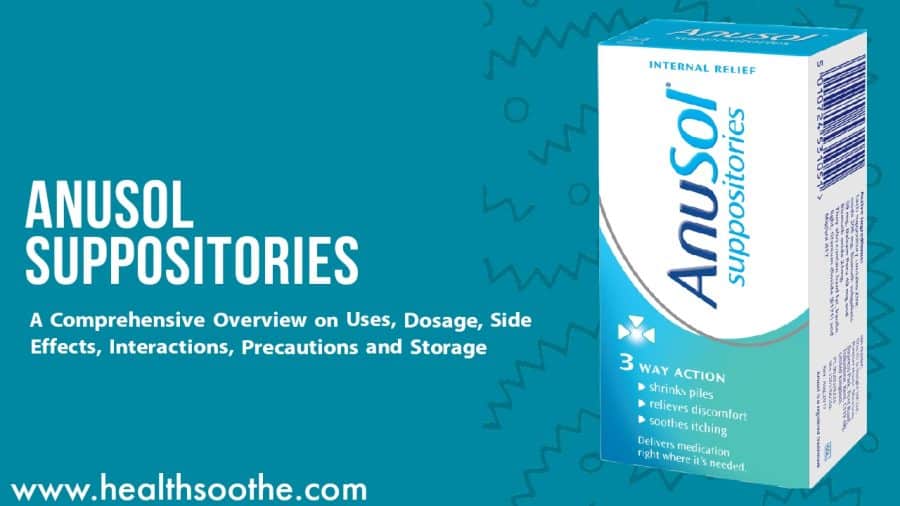Anusol Suppositories are a form of medication which is used to treat symptoms of haemorrhoids and other anal disorders. It is available in both a suppository form and as an ointment. The active ingredients are hydrocortisone acetate, zinc oxide, bismuth subgallate, balsam peru, and allantoin.
Quick Facts About Anusol Suppositories
Anusol suppositories is composed of substances that reduce inflammation, swelling, itching and pain in the anal area. It can also be used relieve many conditions such as hemorrhoids, anal itching, fissures, or perianal abscesses.
While Anusol suppositories has been found to be effective in treating these conditions, there are still some risks associated with taking this drug.
In this blog post, we will provide a comprehensive overview on the proper usage, dosage, side effects, drug interactions, precautions and storage measures of Anusol suppositories.
We will also discuss what you need to know before starting this medication so that you can make an informed decision about your health care.
Anusol Suppositories: Uses
Anusol suppositories are most commonly used to treat hemorrhoids, which are swollen blood vessels in the anal canal. Hemorrhoids can be either internal or external. Anusol suppositories are used to treat both types of hemorrhoids, but they are more effective for treating internal hemorrhoids.
Anusol suppositories can also be used to treat anal fissures, which are small tears in the lining of the anus. Anal fissures can be very painful, and they can make bowel movements very difficult. Anusol suppositories can help to heal anal fissures and make bowel movements more comfortable.
Anusol suppositories can also be used to treat itching and pain around the anus. This is often caused by a condition called pruritus ani, which is an itchiness of the skin around the anus. Anusol suppositories can help to relieve this itchiness and pain.
Lastly, Anusol suppositories can also be used as a lubricant during anal sex. This can help to make anal sex more comfortable and reduce the risk of condom breakage.
Anusol Suppositories: Potential Side Effects
Many medications can cause side effects. A side effect is an unwanted response to a medication when it is taken in normal doses. These side effects can be mild or severe, temporary or permanent.
The side effects listed below are not experienced by everyone who takes this medication. If you are concerned about side effects, discuss the risks and benefits of this medication with your doctor.
The most common side effects of Anusol suppositories are temporary and include;
- Anal burning
- Itching
- Pain
- Irritation.
In rare cases, more serious side effects may occur. These include;
- Allergic reactions
- Rectal bleeding
- Worsening of hemorrhoids.
Although, This isn't a complete list of possible side effects associated with taking Anusol Suppositories. If you experience any of these side effects mentioned above, stop using Anusol suppositories and seek medical help immediately.
To avoid potential side effects, follow the instructions on the package insert carefully. Do not use more or less of the medication than directed. If you are unsure about how to use Anusol suppositories, ask your doctor or pharmacist for advice.
Anusol Suppositories: Precautions
Anusol suppositories are generally safe and well-tolerated, but there are some precautions to be aware of before using them.
If you are allergic to any of the ingredients in Anusol suppositories, do not use them. Talk to your doctor about other options if you have an allergy.
Anusol suppositories should not be used on broken or inflamed skin around the anus or rectum. If you have any open cuts or sores in this area, wait until they heal before using Anusol suppositories.
Anusol suppository should be inserted into the rectum with the pointed end first. It is important not to push the suppository too far up into the rectum, as this can cause discomfort. Once the suppository is inserted, hold it in place for a few minutes before release.
If you are pregnant or breastfeeding, talk to your doctor before using Anusol suppositories. There is limited data on the safety of using them during pregnancy and breastfeeding, so it is best to err on the side of caution.
Anusol suppositories can interact with other medications, so be sure to tell your doctor about all the medications you are taking, including over-the-counter drugs, vitamins, and supplements.
Anusol Suppositories: Interactions
Anusol suppositories can interact with other medications, so it is important to tell your doctor about all the medications you are taking before using them.
The most common interaction is with blood thinners, such as warfarin (Coumadin). Anusol suppositories can increase the effects of these medications and may cause bleeding.
Other potential interactions include with steroids, such as prednisone (Deltasone), and with medications used to treat high blood pressure, such as captopril (Capoten).
This document does not contain all possible interactions. If you are taking any of these medications, talk to your doctor before using Anusol suppositories. Keep a list of all your medications with you, and share the list with your doctor or healthcare provider.
Anusol Suppositories: Dosage
Anusol suppositories are available in three different sizes: small, medium, and large. The size you will need depends on the severity of your hemorrhoids. generally, the larger the hemorrhoid, the larger the suppository you will need.
For mild hemorrhoids, a small suppository (about 1 g) inserted into the anus once or twice a day is usually enough. For more moderate to severe hemorrhoids, a medium or large suppository (about 2 g) inserted into the anus three times a day is typically recommended.
It is important to follow the directions on the package insert carefully. If you have any questions about how to use Anusol suppositories, be sure to ask your doctor or pharmacist.
Anusol Suppositories: Storage
If you are using Anusol suppositories, it is important to store them properly in order to maintain their effectiveness. Here is a comprehensive guide on how to store your Anusol suppositories:
The best way to store Anusol suppositories is in the refrigerator. This will help keep the suppositories from melting and losing their shape. If you do not have a refrigerator, you can store the suppositories in a cool, dry place.
When storing Anusol suppositories, be sure to keep them out of reach of children and pets. In addition, make sure the suppositories are stored in a tight, light-resistant container.
If you are using Anusol suppositories on a regular basis, it is important to check the expiration date before each use. Do not use expired suppositories as they may be less effective and could cause side effects.
Who Should Not Take This Medication?
Anusol suppositories are not recommended for use in children under the age of 12.
They should not be used by women who are pregnant or breastfeeding.
Anusol suppositories are also not recommended for use in people with certain medical conditions, such as bleeding disorders, kidney disease, or intestinal problems.
Bottom Line
In summary, Anusol suppositories can be a great way to treat conditions affecting the anal area. When used correctly, it is an effective and safe treatment for certain kinds of irritation and discomfort.
It is important to always follow the manufacturer's instructions for dosage, storage, and interactions with other medications to avoid any potential side effects or adverse reactions.
With this comprehensive overview on Anusol Suppositories you should now have enough knowledge to decide if they are right for your needs.

My name is Iyanu Kolawole, I’m a professional content writer and web developer. I have always been passionate about writing and developing my coding skills. I started my career as a content writer and have written for several companies and brands. I am also a skilled web developer and have built several websites for businesses and individuals.I am a hardworking individual who is always looking to improve my skills. I am constantly striving to learn new things and to be the best at what I do. I am also a very friendly person and enjoy working with others.
The content is intended to augment, not replace, information provided by your clinician. It is not intended nor implied to be a substitute for professional medical advice. Reading this information does not create or replace a doctor-patient relationship or consultation. If required, please contact your doctor or other health care provider to assist you to interpret any of this information, or in applying the information to your individual needs.






